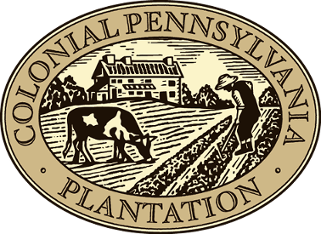- Home
- Visit Us
- Education
- Events And Programs
- Groups and Parties
Our past is your present
At Colonial Pennsylvania Plantation, the 18th century is brought to life for visitors as they experience how colonial farm families lived and worked during a critical period in American history through the preservation, education, interpretation, and active participation in critically endangered historic skills that made 18th century life possible.
In 1971, members of the Bishop’s Mill Historical Society visited a neglected colonial farmhouse dating to the 1690s within Ridley Creek State Park, now included in the National Register of Historic Places. Upon leasing the 112-acre property on which it sat, the founders restored five historic buildings (including the original house), crop fields, and a kitchen garden using painstaking historical and archeological research. In January 1973, the Society evolved with a more ambitious goal of establishing the colonial farm as a museum of Pennsylvania folklife and as a tribute to the hard-working colonial families who helped build America. Through the farm, interpreters could explore and demonstrate how local colonial farmers lived and worked, what they learned, and how their knowledge and life impact the present. The renamed “Colonial Pennsylvania Plantation” opened to the public for the Bicentennial in 1976. Called a “museum in the making,” the site allowed visitors to observe and even participate in the many activities of daily life on a farm in the Revolutionary era.
Today, staff continue the vision of those early founders by maintaining a place where agrarian life of the 18th century and its associated skills remains alive. While the house and farm were owned by the Pratt family during the late 1700s, CPP interprets the life of average 18th century farmers, who composed nearly 90% of Pennsylvania’s early population. Through research and experimentation, staff and volunteers create an immersive experience where visitors are encouraged to directly participate in the daily seasonal tasks of the past. For example, visitors in May experience shearing and processing the wool of the site’s heritage breed Hog Island and Leicester Longwool sheep. In July, visitors are encouraged to help harvest the site’s heritage Red May wheat and Bere barley crops. Besides gaining an understanding of early tools and techniques, interacting with the past offers an appreciation for things often taken for granted today. How does one view a modern closet full of clothes after watching how long it took to make a single garment in the past? How does one look at the many loaves of bread in the grocery store after helping harvest, thresh, and grind enough grain for just one small penny loaf using 18th century tools? Through these activities, visitors are given the chance to directly interact with not just the past, but their ancestors’ past. Everyone has someone in their family tree who was a farmer and by walking in their shoes, even for just a few minutes, one can gain a sense of their own identity.
MISSION: The Colonial Pennsylvania Plantation is an authentic living history site with the purpose of enhancing understanding of 1760-90 farm life in Southeastern Pennsylvania by providing high quality, research based experiences to the public.

